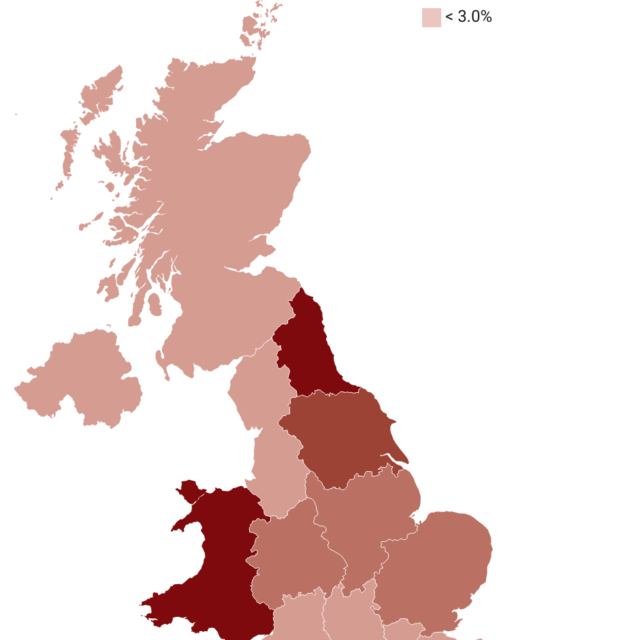The Effect of Inflation on Mortgages and Mortgage Holders
With the Monetary Policy Committee raising interest rates to 5 per cent last Thursday, the financial effect to households of rising monthly mortgage repayments has been very much in the news. However, what is the long-term effect of inflation on mortgage holders? Could it, in some cases, actually be beneficial to borrowers? In our latest Monday Interview, Professor Stephen Millard, Deputy Director of Macroeconomic Modelling, discusses the wider impact of inflation on mortgages with Professor Huw Dixon, our Research Lead for Economic Measurement.

With interest rates rising, is it all doom and gloom for mortgage holders?
There is no doubt that other things being equal, higher mortgage interest rates are bad for mortgage holders. With the average mortgage outstanding in the UK at around £200,000, a 1 percentage point rise in interest rates means an increase of £2,000 per annum in interest payments, or almost £170 per month. This is of course in addition to the capital repayment part of mortgage payments (which does not depend so much on the interest rate, but more on the length of the mortgage). We can see why this can be so much of a problem for households now coming off a low fixed rate of 3% and transitioning to a rate of 7 per cent. The increase in interest payments they face could be almost £670 per month.
But doesn’t inflation help mortgage borrowers?
Put very simply, inflation helps borrowers because it reduces the real inflation-adjusted value of their mortgage. Thus in “real terms”, a £200,000 mortgage will have fallen in value during 2022 by about 10 per cent, or £20,000. In 2023, if inflation averages about 6 per cent, the figure will be £12,000. Thus, in the two-year period 2022-23, a mortgage worth £200,000 in 2021 will have fallen to £168,000 in 2021 prices just by inflation, even if not a penny had been repaid of the original capital by the borrower (on an interest only loan for example). Now of course, wages tend to lag behind inflation, but current wage inflation is not that far behind CPI inflation (the ONS has wage inflation averaging 7%) and in the longer run will almost certainly catch up. So, in the long term the outstanding mortgage will be lower in real terms relative to both prices and wages. In the long run, the mortgage borrower is certainly made better off by inflation. Indeed, those of us who had mortgages in the 1980s can recall how what seemed like a huge mortgage when we took it out was “inflated away” and looked much smaller a decade or more later when wages and prices were much higher. In the terminology of accounting finance, with inflation households will become more “solvent” in that their liabilities (the mortgage) becomes less in relation to their flow of income (wages) or more specifically its current discounted value.
But what about the rise in monthly mortgage payments?
The rise in monthly payments represents a liquidity or “cash-flow” issue. The mortgage contract is fixed in nominal terms: the interest is calculated on the nominal value of the outstanding loan and the capital repayments do not take into account inflation at all. If there is inflation, you are in effect being asked to accelerate the pace of capital repayments: the real value of the debt is falling both because of your repayments and the decline due to inflation. This suggests a very simple solution to the whole issue. Banks should be strongly encouraged to adopt a policy of forbearance with households who find the increased repayments difficult to meet. The simplest policy here is to allow households to opt for suspending or reducing their capital repayments for a period of 2-3 years and only paying the interest plus reduced capital repayments. This would take into account the effect of inflation “repaying” the debt automatically. The suspension could be “tapered” to allow for a more gradual return to full capital repayments when inflation has been back down to 2% for a year.
The advantage of this specific “forbearance” policy is that it is an agreed rescheduling and will not affect credit scores. Also, from an economic point of view it brings the nominal mortgage contract more into line with the first-best “optimal” loan contract which would take into account inflation. The improved solvency of households due to inflation would mean that in the long run they are more likely to meet their mortgage repayments to completion with forbearance than if there is not forbearance.
Finally, how are banks affected by all this?
Banks are not much affected by inflation. Their balance sheet consists largely of nominal assets: loans and deposits are mostly not indexed to inflation. Without the forbearance, Banks will find their mortgages go bad as cash-strapped households default on their mortgages, which may even lead to re-possession of houses as it did in the mid-1980s and early 1990s when interest rates were high. This will reduce the value of mortgage assets as default rates increase and cause problems for banks. However, with forbearance, in effect the outstanding value of their assets is increased (since less is being repaid in nominal terms by borrowers), which can be matched by a corresponding increase in nominal liabilities (for example, increased borrowing from wholesale markets based on the increase in asset values). The improved solvency of mortgage borrowers will make the mortgage assets more valuable as they are more likely to be repaid.
Jeremy Hunt has just introduced a policy that is partly in line with this notion of forbearance. Households can apparently switch temporarily to “interest only” for a 6-month period and repossessions are delayed for 12-months. Households can also increase the length of their mortgages. This policy does not really show an appreciation of the underlying economic principles and should be extended for a longer time. I am happy to advise them on how to do this properly!






